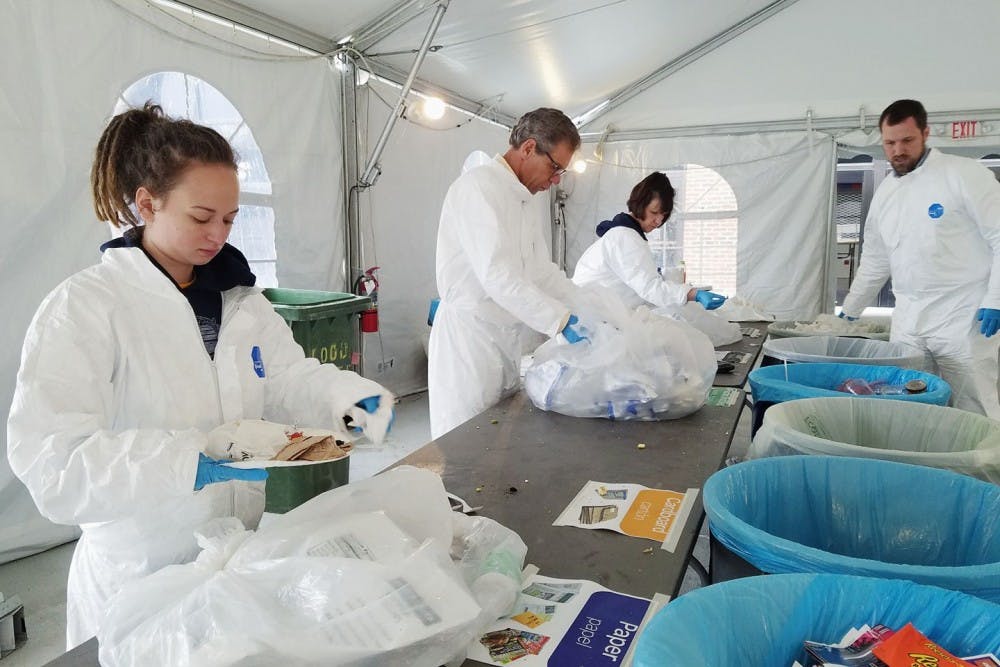The Office of Sustainability has created a simple, transparent way for students to keep track of the university’s progress on sustainability-related initiatives and its plans for the future, as well as areas where improvement is needed.
At the end of January, the Office of Sustainability released an extensive sustainability report to provide students, faculty and staff with information about how the campus is performing in certain sustainability categories.
“If you have a map, but don’t know where you are on that map, it’s a useless tool,” Rob Andrejewski, the director of sustainability, said. “It’s not until you can orient yourself and figure out your destination that you are able to figure out the best route to get there.”
The report includes a self-evaluation of the university’s sustainability in four main categories, using the Sustainability Tracking, Assessment and Rating System (STARS), created by the Association for the Advancement of Sustainability in Higher Education (AASHE). There are 808 institutions from all over the world that have taken part in STARS.
Office of Sustainability first completed the STARS report in 2016, but has since put together a separate report for increased information and understanding.
“For a long time, I feel like the sustainability office didn’t have a big presence,” junior Ashley James, an intern at the Office of Sustainability, said. “We were on campus, but it wasn’t something everyone knew about. I’m really glad that we’re making our report and trying to do more to get more attention.”
The Office of Sustainability is working toward hosting more events on campus and greater student, faculty and staff involvement.
From Feb. 4 to April 1, the office is hosting a national recycling competition, RecycleMania, with the goal of diverting 80 percent of waste from the landfill.
The university’s first zero-waste basketball game, which was held at the last men’s basketball home game on Feb. 21., was a part of the RecycleMania competition. Concessions used compostable items and volunteers helped direct the waste to the appropriate bins. Andrejewski said that there had been about 55 volunteers participating.
“The ultimate goal is for people to understand that there’s no such thing as ‘away,’” Andrejewski said. “When you throw something away, it still goes somewhere.”
At the end of the game, only 13 percent of the waste went to landfill, an improvement over the usual 60 percent of waste.
Other events within the RecycleMania competition are an E-waste Disposal, where people can recycle their old electronics, Food Day, a day of learning about sustainable food, and the sustainability and art gallery talk.
Enjoy what you're reading?
Signup for our newsletter
Andrejewski said that overall, the university has improved from the last STARS report in 2013.
According to the sustainability report, the university does well in the area of campus engagement, scoring a 15.38 out of 20. This score is calculated by tallying up how the university measured in a series of subcategories. For example, in the student life subcategory, the university scored a two out of two, because students have participated in multiple competitions, including RecycleMania.
Junior Paige Dunlap, an intern at the Office of Sustainability, said that she has noticed students becoming more involved in certain activities, such as depositing items in the donation stations around campus.
“I see that people are actually using them and they don’t go and throw out the clothes in the laundry room, they put them in the bin,” Dunlap said.
One category on which the university does not score as high in the report is operations, including energy, scoring a 1.22 out of 10.
Andrejewski said the university was more energy-efficient than it had ever been before. But one of the main problems is that building space on campus has increased by 10 percent over the years, and it has led the university to increase its emissions.
“We need to be doing more to not emit greenhouse gases,” Andrejewski said. “We have plans to, but we aren’t there yet."
Contact features writer Stephanie Hagan at stephanie.hagan@richmond.edu
Support independent student media
You can make a tax-deductible donation by clicking the button below, which takes you to our secure PayPal account. The page is set up to receive contributions in whatever amount you designate. We look forward to using the money we raise to further our mission of providing honest and accurate information to students, faculty, staff, alumni and others in the general public.
Donate Now



